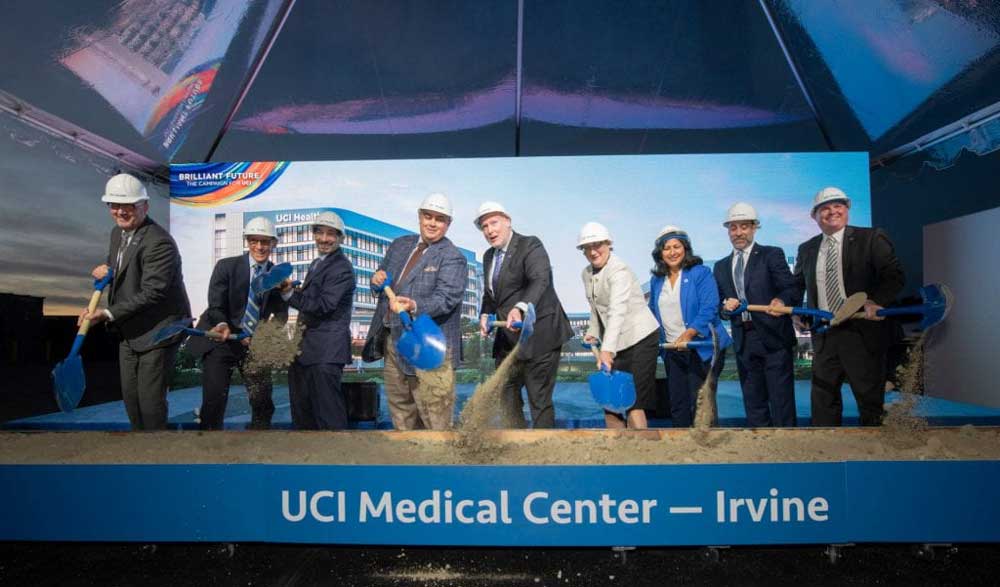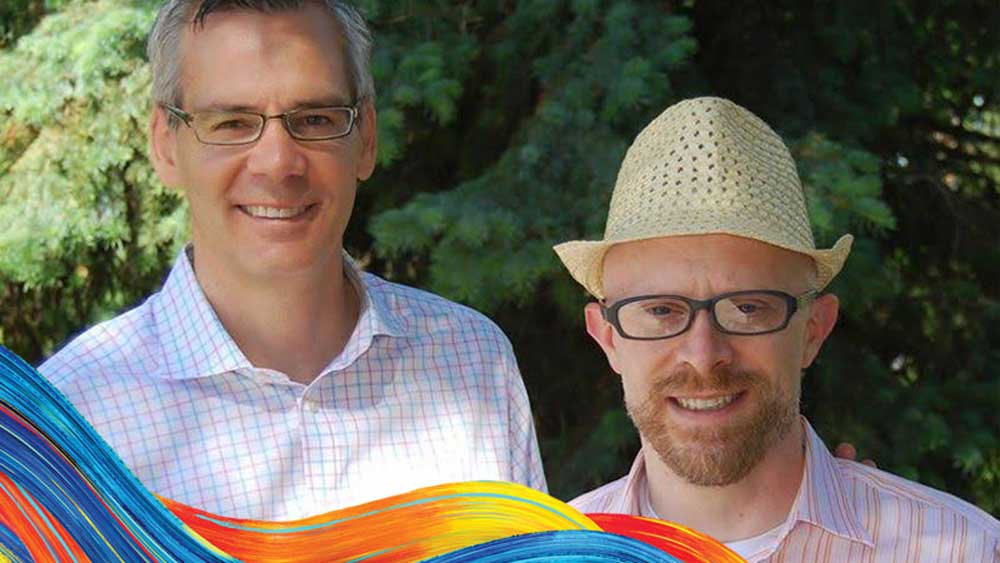November 2021
Dear Anteater community:
The days are shorter and cooler, midterms are over, and Thanksgiving is almost upon us. As always, we at UCI have a lot to be thankful for. Here are a few highlights.
Medical center groundbreaking

A new era in healthcare delivery in coastal Orange County was celebrated last week with the official groundbreaking ceremony for the UCI Medical Center-Irvine. The complex, located on the north end of the campus where Jamboree Road meets Campus Drive, will include a 144-bed acute care hospital with an emergency room, an outpatient Center for Advanced Care with primary and specialty health services, a Center for Children’s Health and the Chao Family Comprehensive Cancer Center and Ambulatory Care building. It will connect with the UCI Health primary care network throughout Orange County, creating the coastal region’s only health system supported by one of the nation’s premier academic research institutions.
UCI breaks ground on new hospital, medical complex in IrvineUCI and climate change
UCI has long been a leading voice in the investigation of the causes, impacts, and ramifications of climate change. Our faculty’s research, which ranges from forecasting flooding in and around Newport Beach to measuring the melting of the polar ice caps to determining the increase in health risks to improving wind and solar energy technology, is at the forefront of national and global efforts to deal with this looming crisis. In this special report, you can read about UCI’s all-encompassing, cross-disciplinary approach to climate change studies in California.
On the same topic, at the recently concluded COP26 international summit on climate change, Michael Méndez, assistant professor of urban planning & public policy, moderated a press conference on California’s approach to integrating environmental justice into climate solutions. He and the panel of three California legislators explored how our state has taken bold action in its climate policies, trying to move away from fossil fuel consumption and advance environmental justice by implementing initiatives to protect residents from harmful pollution and build climate resilience in disadvantaged areas.
Chancellor’s Professor Frank LaFerla, dean of the School of Biological Sciences, and Professor Travis Huxman, chair of the Department of Ecology and Evolutionary Biology, wrote an op-ed titled “We Expect Too Much From Earth” that was published by The Hill coinciding with the COP26 conference. They discuss the urgent need to stop questioning the science and to devote more effort and resources to our conservation investments and clean energy commitments. Stressing the interconnectedness of all life forms on earth, they argue that if we continue to make the same resource choices we have made up until now, our way of life will no longer be sustainable.
Coping with crises
In the fall issue of UCI Magazine, Tyrus Miller, dean of the School of Humanities and professor of art history & English, wrote a fascinating and important article about necessity of humanistic perspectives during crises. As we emerge from the COVID-19 pandemic, he posits that the humanities are a centuries-rich archive of ways to interpret human experience in all its maddening perversity and stunning ingenuity. In his view, the humanities remain perennial resources of insight and hope in dark times.
Institute for Meaningful Engagement

Pheather Harris, director of the UCI California Alliance for Minority Participation at the Center for Educational Partnerships, received a five-year, nearly $3 million grant from the National Science Foundation to boost STEM degree success for underrepresented students. As the principal investigator of the Institute of Meaningful Engagement, she has put together an all-star team of co-principal investigators, including Michael Dennin, vice provost of teaching & learning and dean of undergraduate education; Brian Sato, associate dean of the Division of Teaching Excellence & Innovation and professor of teaching in the Department of Molecular Biology and Biochemistry; Natascha Buswell, assistant professor of teaching in the Department of Mechanical & Aerospace Engineering; and Glenda Flores, associate professor in the Department of Chicano/Latino Studies. They will address the campus environmental factors that are pushing underrepresented students out of STEM programs.
NSF funds UCI project to boost STEM degree success for underrepresented studentsFaculty honors
Michael Franz, Chancellor’s Professor of computer science in the Donald Bren School of Information & Computer Sciences, has been selected as the recipient of the 2022 Charles P. “Chuck” Thacker Breakthrough in Computing Award by the Association for Computing Machinery. The award recognizes “individuals or groups who have made surprising, disruptive, or leapfrog contributions to computing ideas or technologies.” Professor Franz was recognized for his development of just-in-time compilation techniques that enable fast and feature-rich web services on the internet – services now used by billions of people daily with applications such as Gmail and Facebook.
Alon Gorodetsky, associate professor of chemical and biomolecular engineering in the Henry Samueli School of Engineering, has been named a 2021 Director’s New Innovator by the National Institutes of Health. He is one of only 64 researchers in the nation to earn this recognition, which supports unusually innovative biomedical research from early career investigators. Professor Gorodetsky will receive more than $2.2 million over five years for his research to develop cephalopod-inspired methods and technologies for controlling cell-to-cell communication. This methodology ultimately could be leveraged to guide cell fate and direct tissue development, opening new paths to clinically relevant applications.
Congratulations to Professors Franz and Gorodetsky!
Faculty member supports undergraduate education abroad

The Gerardo Okhuysen and Chris Pounds Scholarship Fund was established to nurture global citizens at The UCI Paul Merage School of Business.
It is very gratifying when those who know us best, members of our own campus community, are generous in their support of our mission. Gerardo Okhuysen, senior associate dean and professor of organizational behavior in the Paul Merage School of Business, and his husband, Chris Pounds, director of corporate strategy for business analytics at Edwards Lifesciences, have established a scholarship fund for Merage School undergrads with dreams of studying abroad. The Gerardo Okhuysen and Chris Pounds Scholarship Fund will help enrich the student experience for undergraduate students struggling to find a way to pay for international residential study. Professor Okhuysen and Mr. Pounds, who each have considerable international experience, believe that exposing students to new cultures, ideas, and ways of doing business will enrich their worldview and have far-reaching benefits. On behalf of a grateful campus, thank you.
New Scholarship Fund Will Support Undergraduate Global ExperiencesNew approach to clinical trials
UCI is a founding member of the Advancing Clinical Trials at the Point of Care coalition. ACT@POC will generate high-quality clinical research evidence in real time to better evaluate treatments and therapeutics, including those to treat COVID-19. Its members will engage a broader, more diverse group of patients and providers and develop digital health tools that make clinical trials simpler to run and more accessible to patients. Currently, the complexity and cost of traditional clinical trials pose obstacles to patient and provider participation, identification of effective treatments for diseases, and the acceleration of new clinical insights and knowledge. This multi-stakeholder coalition aims to drive implementation of large-scale clinical trials at the community level – in the doctor’s offices and care facilities where most of the U.S. population receives care. Other founding members of ACT@POC include the Duke-Margolis Center for Health Policy, the MITRE Corp., the Cure Drug Repurposing Collaboratory, Duke University Health System, Emory University’s Morningside Center for Innovative and Affordable Medicine, Intermountain Healthcare, the Mayo Clinic and the Broad Institute.
The Program in Public Health has launched the Center for Environmental Health Disparities Research. Led by Jun Wu, professor of environmental & occupational health, and Alana LeBrón, assistant professor of health, society, & behavior and Chicano/Latino studies, the center is dedicated to addressing environmental justice through community-based research and promotion of equitable environmental health policies locally and nationally. It will engage myriad disciplines beyond public health to solve complex issues in environmental justice, including engineering, urban planning, medicine, nursing, pharmacy practice, and anthropology. The work will extend beyond campus and into the local communities with a goal of developing new community partnerships and building upon the successes of existing ones.
As we approach the brief Thanksgiving break, I extend to each of you my best wishes for an enjoyable, restful, and filling holiday with family and friends.